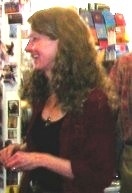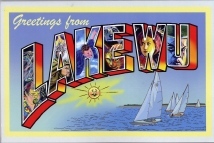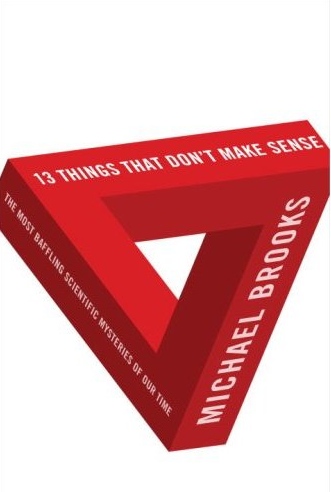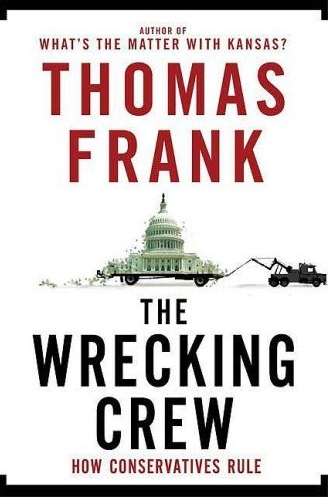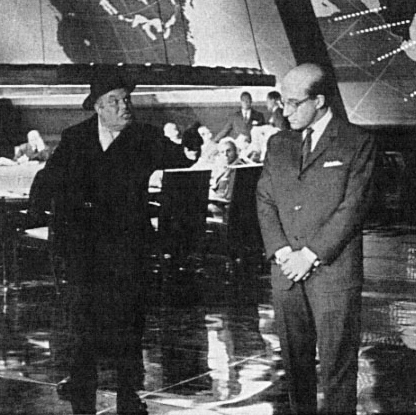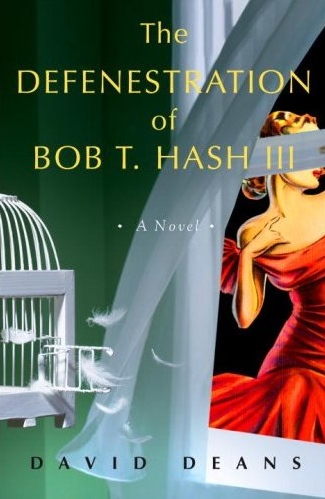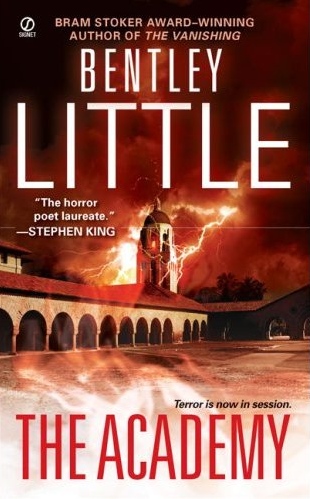|
|
|
|
This Just In...News
From The Agony Column
|
| |
|
07-25-08 : Michael Brooks Looks at '13 Things That Dont Make
Sense' ; Agony Column Podcast News Report : Patrick Nielsen Hayden at
Comicon
|
"The Most
Baffling Scientific Mysteries of Our Time"
We like to think that
science is pretty well settled. We know what we know, and while there
is more to know, we've got the essentials down, and now, its a
matter of sorting out the details.
Like, what 96% of the universe is made of.
Wait, 96%? That's not really in the realm of "detail". That
suggests we dont know doodely-boodely about well, MOST OF THE UNIVERSE.
And that's the point, really, of '13 Things That Dont Make Sense:
The Most Baffling Scientific Mysteries of Our Time' (Doubleday / Random
House ; August 12, 2008 ; $23.95). Based on a 2005 article in New
Scientist of the sort that gets emailed and linked so relentlessly
it gets pegged as "the sixth most circulated story on the Internet,"
'13 Things That Dont Make Sense' is a straightforward look at something
one rarely considers, the boundaries of science. As Shel Silverstein put
it, where the sidewalks end.
Brooks' new book looks at thirteen places where scientists are pretty
much forced to throw up their hands and say, "I dunno." It's
not something that comes easy to those in the scientific world, and Brooks,
a science writer with a Ph.D. in quantum physics should know. But as he
points out in the prologue to his book, this is really where you can either
get all depressed because we really dont know what the hell is
going on, or inspired, because these may be the places where breakthroughs
are made that will result in that crashing but not unimportant cliché,
"paradigm shift." After all, we once knew that the universe
was clockwork, just like it is in Jay Lake's novels, 'Mainspring' and
'Escapement'. Alas, we dont live in that easily-known universe,
but the universe we've got will at least offer ample employment opportunities
in the sciences.
Obviously, you're going to get a chapter on Dark Matter, which was the
title of a not-bad book by Star Trek scribe Garfield Reeves-Stevens.
But there are lots of other science fiction novels covered here as well.
One of my favorites is 'Definitely Maybe' by Boris and Arkady Strugatsky,
a story in which the physical laws of our universe start to change. John
Webb, a professor of physics at the University of New South Wales in Sydney,
Australia, first stumbled across changing laws when he discovered holes
in the rainbow. It may sound like something that would happen on Sesame
Street, but that's sort of the point of this book; that scientifically,
we are more often than not, still on Sesame Street with regards
to our understanding of how the world works. We thought it might just
be consistent, but Webb has discovered this may not be the case.
Brooks writes entertainingly about science, mixing in hard results with
scientific history that gives the reader the sort of perspective one requires
to doubt.
He also includes some pretty surprising choices, at least to me. Cold
fusion, for example, which has been labeled a hoax about as often as Bigfoot
– and somewhat more successfully – gets put into the mix here.
I was under the impression that it was all over, but that scientific zombie
keeps on rearing up. Then there's the idea of "free will," which
seems to me to be more of a religious debate than a scientific one –
but not according to Brooks, who starts out by looking at "alien
hand syndrome."
And this of course, leads us back to that great scientific thinker, Charles
Hoy Fort, who quite correctly observed that, "I can conceive of nothing,
in religion, science or philosophy, that is anything more than the proper
thing to wear, for a while." He doesn't quite make it into Brooks'
book, which suggests just one more thing outside the boundaries of science
– the question of just what, precisely, makes one a scientist.
|
Agony Column Podcast
News Report : Patrick Nielsen Hayden at Comicon : Tor Books Sets Up
Shop
|

|
A pensive man. |
Care to immerse yourself
in the immortal battle for the pocket change of millions of indolent fourteen
year-old boys – and those who act like them – at Comicon 2008?
Then simply click
this link to hear Patrick Nielsen Hayden talk about Tor's second year
of setting up shop amidst the Philistines. Hayden's arguably the top
man in the SF World, and his ever-entertaining thoughts are apparent even
amidst the swirling chaos of Comicon 2008 via cell phone. Oh sure, Tor.com
has coverage, but not someone from without (me) talking to the Ultimate
SF Insider (Mr. Patrick Nielsen Hayden). Thrill to high-quality audio
one gets when conversing with a human standing amidst the human throng.
Be chilled by his observations of what the Conquest of the Comics means.
Is it the end of the world? Hell, that happened weeks ago, when Bear-Sterns
crashed. Just ask anyone who held Bear Sterns stock.
|
| |
|
07-24-08: Thomas Frank Brings on 'The Wrecking Crew' ; Agony Column
Podcast News Report :A Conversation With Nancy Rutland of BookWorks
in Albuquerque, New Mexico
|
Political Horrors
|
Bring
dynamite and a crane / blow it up and start all over again / build
a town be proud to know /this place called tobacco road |
The horror. The horror.
It doesn't matter which end of the spectrum you happen to reside in. Things
look pretty dire from any direction at this point in the proceedings.
These are "feel bad" times and fingers are going to be pointed.
Who better to do so than Thomas Frank? He's the man who
asked 'What's the Matter With Kansas?' and in answering his own question,
described a cultural divide that haunts the nation, or at least half of
it. Now he's back to finish the job with 'The Wrecking Crew: How Conservatives
Rule' (Metropolitan Books / Henry Holt ; August 5, 2008 ; $25), a full-tilt
past, present and near-future history of so-called conservatism that exhumes
the past with an eye towards rot, graft and corruption. It's the kind
of book that will basically make everybody extremely angry, for completely
opposite reasons.
The problem with books like 'The Wrecking Crew' is often unfortunately
that they're so damn good; well-written with lively prose, impeccably
researched and persuasively argued. Frank is one of the top practitioners
in this burgeoning genre, mostly by virtue of the "impeccably researched"
portion of the book. As Frank lays out the story of how conservatives
embarked on a course to dismantle government and re-jigger it to benefit
those who are at the helm of a few multi-national corporations, pretty
much any reader is going to feel sicker ... and sicker ... sicker. 'The
Wrecking Crew' will leave you longing for a Dr. Strangelove, praying for
a much jauntier apocalypse than that which Frank unravels in sickening
detail.
Frank begins with portrait of DC as, "a capital undone and remade
by Ronald Reagan and George Bush and a thousand wild-eyed de-regulators,"
and focuses on the wealthy suburban utopia of Loudon County, Virginia,
the richest county in the U. S. of A. It's a disturbing portrait. Having
set the scene, he gives readers A Brief History of Conservatism, starting
with Warren Harding's hope, "for an end to Government's experiment
in business, and for more efficient business in Government administration,"
quickly leapfrogging to a conservative, "mutation specifically adapted
to survive a disaster of the 1929 variety." Given the current rate
of bank failures and the downward spiral of the dollar, it seems that's
a version of conservatism that's well-prepared for what's coming down
the pike. 'The Wrecking Crew' is itself a sort of wrecking crew, as it
carefully de-constructs the conservative movement into a series of assaults
of the wealthy on the poor and the middle class.
|
We
must not allow a mine-shaft gap! |
Of course, the reading public for this book is going be pretty sharply
divided, though Frank's ability to marshal actual facts is going to require
those who would criticize the content (as opposed to the execution) to
basically point and say, "Pooty! Pooty liar!" And I have to
say that books of this nature worry me greatly, not because I disagree
with them, but because these well-intentioned jabs (jab hell, this is
a full on vivisecting evisceration!) tend to bring out blowback that gets
more news coverage and more favorable news coverage than the material
that generated the story in the first place. That said, what Frank says
here needs to be said. We're clearly in a world of hurt at this moment,
literally; a global war, arguably a world war is taking place and as the
resources it destroys vanish, every economy starts to spiral the drain.
I think just about every reader who picks up this book, no matter what
their political persuasion, will want to throw it through the window upon
concluding it; half because it paints an undeniably accurate but bleak
picture of the world as they perceive it and half because it's all a pack
of lies and exaggerations. But no matter what side you fall on, you can
certainly enjoy Frank's ghoulish, graveyard logic, smart arguments and
clean prose. Now, I will admit to one disappointment; when I looked up
"mining," I noted that Frank was not missing one the major challenges
to come forth. Nowhere does he address the mine-shaft gap. And you know
– we must not allow a mine-shaft gap!
|
Agony Column Podcast
News Report : A Conversation With Nancy Rutland of BookWorks in Albuquerque,
New Mexico : Handselling Books
Today's podcast is
a conversation with bookseller Nancy Rutland of BookWorks
in Albuquerque, New Mexico (I mention this because there's a BookWorks
where I live in Aptos, as well.)
She tells a fascinating story of over twenty years in the business and
talks about wonderful method of handselling books.
You can
hear that story via this MP3 link, or as ever, subscribe to the podcast.
|
| |
|
07-23-08: David Deans' 'The Defenestration of Bob T. Hash III' ; Agony
Column Podcast News Report : Jay Lake and Susan Palwick Moderated by
Terry Bisson at SF in SF, July 12, 2008
|
Windows of the
Mind
|
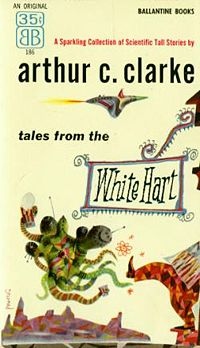
|
Not the iteration I bought, probably one generation before.
But Ballantine! |
OK, so sometimes reading
will teach you a new word. I vividly recall the first time I
encountered the word "defenestration" – it's that kind
of word, isnt it? It was at the very beginning of my long reading
career, when I first started buying the Arthur C. Clarke
matched mass-market paperbacks that Ballantine did in the run-up to the
premiere of 2001: A Space Odyssey. One of those was 'Tales from the White
Hart', an oddball, not-all-SF collection of short stories told in a bar,
a classic SF trope under which many an author has worked at the edges
of the genre in a comedic mode. And within 'Tales from the White Hart',
I stumbled across that new word in the title of the story, "The Defenestration
of Ermintrude Inch," about a man who thinks his wife talks too much.
Since "defenestration" means "the act of throwing a thing,
esp. a person out of a window," you can imagine that things did not
go well in the Inch household.
Things are not going well in the Hash household either, at least not in
'The Defenestration of Bob T. Hash III' (Random House ; August 5, 2008
; $22) by David Deans. Ol' Bob appears to have been up
to no good. But that isnt particularly clear to anyone other than
Bob's beloved pet, an African gray parrot named Comenius. And Comenius
doesn't get the picture until he is transformed into the spitting image
of his one-time master. It's a reverse-Kafka move whose consequences are
concealed by the fact that Bob himself has done a runner to Acapulco with
his outside-the-marital-bliss main squeeze. That leaves Comenius, now
Bob, to experience that lovely feeling so many people these days experience
– imposter syndrome. Of course, Comenius is in fact an imposter,
so the syndrome is itself transformed.
|
Another
Photoshop hack-n-slash from stock images. |
Expect a great narrative voice, lots of Northern Hemisphere Magical Realism
and better still, lists and grammar lessons. Expect the original Mr. Hash
to play a part in the proceedings and then take every other expectation
you have and, appropriately, toss them out the window. You probably already
know at this point if this is the sort of book you might just love, and
about three minutes in the bookstore will tell you just that. Deans has
the sort of low-key sense of humor that makes the pages fly by. For this
book involves throwing and windows, those who read it are quite unlikely
to subject the book itself to defenestration. Now, is it only me, or does
defenestration seem to prefer a closed, thin glass window for extra drama?
|
Agony Column Podcast
News Report : Jay Lake and Susan Palwick Moderated by Terry Bisson at
SF in SF, July 12, 2008 : SF Confessional
Today's Agony Column
Podcast News Report is a recording of the panel discussion from SF in
SF on July 12, 2008, featuring Jay Lake and Susan
Palwick "moderated" by Terry Bisson. Talk about
lively – I had to do some major adjustments on sound levels as voices
rose and fell, so please excuse any audible seams. That
said, here's a link to the panel discussion, which, if the previously
podcast interviews and stories haven't, should close the deal on sending
readers to the bookstore to pick up Palwick's and Lake's work.
|
| |
|
07-23-08: Bentley Little Enrolls in 'The Academy' ; Agony Column Podcast
News Report : Jay Lake Reads at SF in SF, July 12, 2008 : The Goat Cutter
|
Library Zombies
About halfway through
Bentley Little's latest horror novel, 'The Academy' (New
American Library / Signet / Penguin Putnam ; August 5, 2008 ; $7.99),
one of the characters has a vision of a high-school library as populated
by "whey-faced zombies". I like that image a lot, but then,
I like Bentley Little a lot. It's funny how just last week I was writing
about the 1980's-style horror novel from Michael Jasper, 'A Gathering
of Doorways' and just like clockwork, in comes a tried and true actual
1980's horror author, still offering up novel after novel of tightly-written,
bleakly funny, Terror-Americana.
Little first burst on the scene in the small press at the tail end of
the 1980's, and his first novel, 'The Revelation' was published in hardcover.
But since then, he's been a mass-market paperback writer and has cranked
out a series of novels with simple titles ('The Store' ; 'The Town' ;
'The House') and pretty simple formulas. Little creates a typical American
suburb and then "invades" it with a chain store, a college or
in this case, an upscale charter school that proves to be the font of
evil. No, wait, make that Evil. Capital "E".
Little has a knack for creating characters that seem like you and your
neighbors and then ratcheting up tension by subsuming them one by one,
into a well-plotted whirlpool of violence and horror. Little knows how
to split the difference in terms of supernatural intervention, which is
a key factor in making his novels enjoyable and actually disturbing. Some
of what happens comes to pass because, well, there's an Evil (capital
"E") out there that wants things to go badly. But a fair portion
of the mayhem comes from within the weaknesses of his characters, and
Little knows just how to shade them so that the people feel real even
when they start to oh, kill one another.
He also knows the power of embarrassment, that it's sometimes worse to
make an ass of yourself or make a terrible life-choice than it is to start
whacking people with an axe. He puts you in all kinds of discomfort and
then some 400-ish pages later he might give you a dollop of hope. Not
much. If we're really headed for another Great Depression, Little might
have if not the cure, at least a palliative, in the form of novels which
convince the reader that, yes, it could get worse. It might already be
worse. Why worry about money when you've got a library full of zombies
– assuming that's not already and always the case.
|
Agony Column Podcast
News Report : Jay Lake Reads at SF in SF, July 12, 2008 : 'The Goat
Cutter'
Today's Agony Column
Podcast News Report is a recording of Jay Lake reading
the story 'The Goat Cutter' from his collection 'Greetings from Lake Wu'.
It's a nice match with the 1980's horror theme, and Lake brings a fine
Texas accent to a story that might, as he mentions, change how you feel
about duct tape. Here's
the link, but be careful what you listen to – you might not
just hear the words, but understand them.
|
| |
|
07-21-08: A 2008 Interview With Stella Rimington
|
"There's much,
much more technology around now, but still, the best intelligence comes
from people"
|
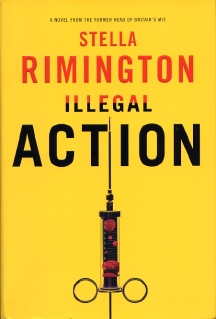
|
Not a word to spare. |
I whipped through Stella
Rimington's 'Illegal Action' in a couple of reading sessions
even though I was taking copious notes for our interview. It's a fast-paced,
exciting novel that is bristling with intelligence in all senses; its
well-written, entertainingly informative and artful but not self conscious
about it, as well as being about spy tradecraft. Rimington is incredibly
concise. There's not a single extra word in this entire novel, one almost
regrets how eminently readable it is. Unless you're preparing for an interview,
I'd suggest that you slow down as much as possible; this is a book to
savor. It's also the third book in her Liz Carter series; the first is
'At Risk' and the second is 'Secret Asset'. Believe me that you'll be
wanting to read them all if you start with the third, so you might as
well begin with 'At Risk'.
In person,
Dame Rimington is every bit as eloquent as you might expect the Director
General of Britain's MI5 to be. I admit, I strayed well beyond the subject
of her novel to get a glimpse at her remarkable life's story. She's spent
thirty-something years in MI5, starting in the 1960's when the very existence
of the agency was still secret. You
can hear her story from this link. The interview begins with a two-minute
reading from 'Illegal Action', just to give you a flavor for Rimington's
speaking voice and written voice as well. The headline quote is a small
part of her answer to my question about the changes she's seen in her
time, but it's clear that Rimington herself is the sort of intelligence
that makes things happen – or keeps them from happening.
|
| |
|
|
